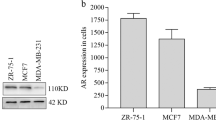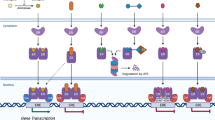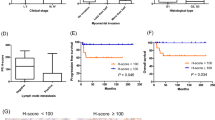Abstract
Aminoglutethimide without glucocorticoid has been shown to be a clinically effective treatment for postmenopausal breast cancer in low dosage (250 mg day-1). The mechanism of action of this approach is thought to be the inhibition of peripheral aromatase, the enzyme which converts androstenedione to oestrone. The activity of this enzyme was measured in vivo by injection with 3H-androstenedione and 14C-oestrone and found to be 0.20% +/- 0.05 in 5 patients on low dose AG therapy. In comparison with previously published data this demonstrates a 92% inhibition of peripheral aromatase activity confirming aromatase inhibition as a viable aim in the endocrine treatment of breast cancer.
This is a preview of subscription content, access via your institution
Access options
Subscribe to this journal
Receive 24 print issues and online access
$259.00 per year
only $10.79 per issue
Buy this article
- Purchase on Springer Link
- Instant access to full article PDF
Prices may be subject to local taxes which are calculated during checkout
Similar content being viewed by others
Rights and permissions
About this article
Cite this article
Dowsett, M., Santner, S., Santen, R. et al. Effective inhibition by low dose aminoglutethimide of peripheral aromatization in postmenopausal breast cancer patients. Br J Cancer 52, 31–35 (1985). https://doi.org/10.1038/bjc.1985.144
Issue Date:
DOI: https://doi.org/10.1038/bjc.1985.144
This article is cited by
-
Proteasome inhibition represses ERα gene expression in ER+ cells: a new link between proteasome activity and estrogen signaling in breast cancer
Oncogene (2010)
-
Influence of aminoglutethimide on plasma oestrogen levels in breast cancer patients on 4-hydroxyandrostenedione treatment
Breast Cancer Research and Treatment (1992)
-
Aminoglutethimide in advanced breast cancer: plasma levels and clinical results after low and high doses
Cancer Chemotherapy and Pharmacology (1991)
-
Aminoglutethimide enzyme induction: pharmacological and endocrinological implications
Cancer Chemotherapy and Pharmacology (1990)



